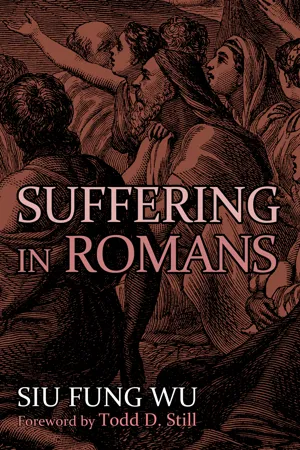
- 308 pages
- English
- ePUB (mobile friendly)
- Available on iOS & Android
Suffering in Romans
About this book
Most of the Jesus-followers in Rome would have been familiar with socioeconomic hardship. Suffering was a daily reality either for themselves or for someone they knew. Many lived below or just above subsistence level. Some were slaves, homeless, or chronically sick. Followers of Christ might have experienced persecution because of their refusal to take part in the local religious festivals. Suffering is, of course, a significant theme in Rom 5: 1-11 and 8: 17, 18-39. Paul mentions various types of affliction many times in these texts. How might Paul's audience have understood them? In Suffering in Romans Siu Fung Wu argues that Paul speaks of the vocation of the Jesus-followers to participate in Christ's suffering, with the purpose that they may be glorified with him. Indeed, their identification with Christ's suffering is an integral part of God's project of transforming humanity and renewing creation. It is in their faithful suffering that Christ-followers participate in God's triumph over evil. This is counter-intuitive, because most people think that victory is won by power and strength. Yet the children of God partake in his cosmic victory by their suffering, aided by the Spirit and the hope of glory.
Information
Table of contents
- Title Page
- Foreword
- Preface
- Abbreviations
- Chapter 1: Aim and Approach of Study
- Chapter 2: Social Location of the Audience and Ancient Worldviews on Suffering
- Chapter 3: From Adamic Humanity to a New Humanity in Christ
- Chapter 4: The Work of Christ and the Eschatological Spirit
- Chapter 5: The Vocation to Participate in Christ’s Suffering
- Chapter 6: Cosmic Renewal and the Purpose of Suffering
- Chapter 7: Participating in the Triumph of God
- Chapter 8: Overall Conclusion
- Appendix A
- Appendix B
- Appendix C
- Appendix D
- Appendix E
- Appendix F
- Appendix G
- Appendix H
- Bibliography
Frequently asked questions
- Essential is ideal for learners and professionals who enjoy exploring a wide range of subjects. Access the Essential Library with 800,000+ trusted titles and best-sellers across business, personal growth, and the humanities. Includes unlimited reading time and Standard Read Aloud voice.
- Complete: Perfect for advanced learners and researchers needing full, unrestricted access. Unlock 1.4M+ books across hundreds of subjects, including academic and specialized titles. The Complete Plan also includes advanced features like Premium Read Aloud and Research Assistant.
Please note we cannot support devices running on iOS 13 and Android 7 or earlier. Learn more about using the app